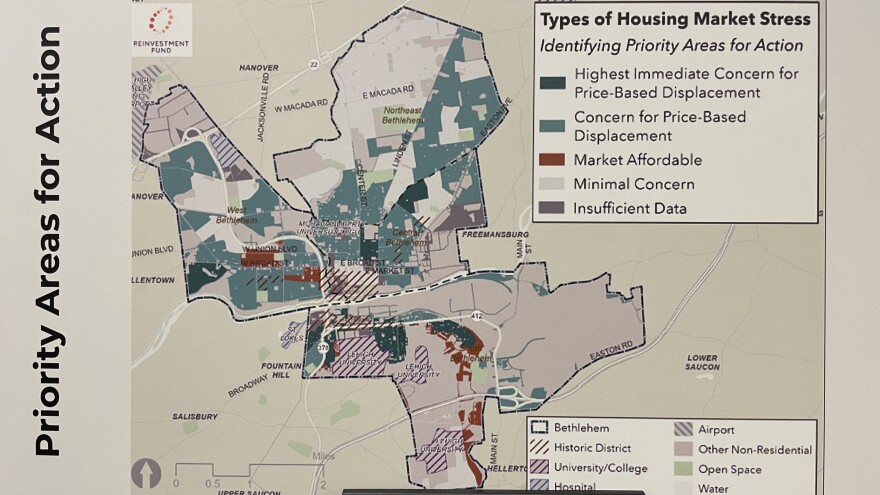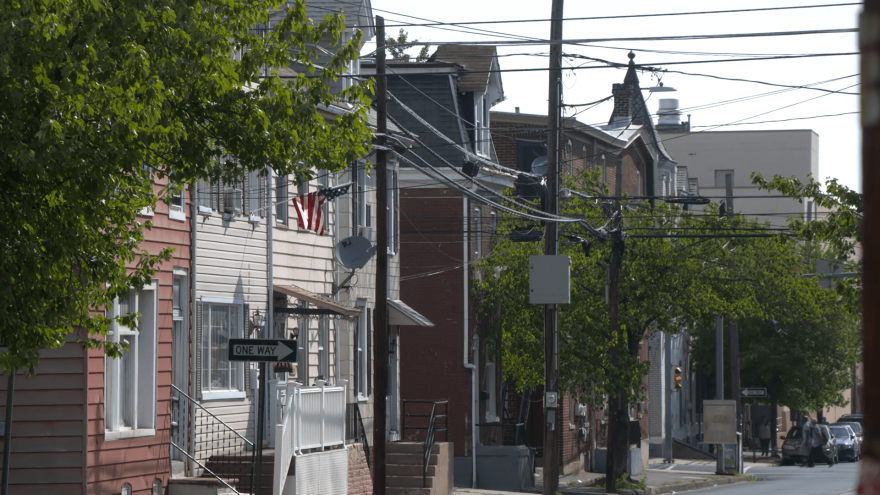BETHLEHEM, Pa. — As one of the newest parts of its affordable housing strategy, the city of Bethlehem looks to implement eviction prevention and rental assistance measures through mediation, court representation and rental funding.
That would come with some coordination from other institutions around the community.
Sara Satullo, city deputy director of community development, at a community open house on Wednesday, said groups like New Bethany — which would be tasked to help in the new efforts — are no strangers to the topic of housing.
Satullo said the organization distributed over $11 million in rental assistance funds to thousands of families over the course of the COVID-19 pandemic.
“We’re all talking together and working together and pooling our resources to create a new pipeline to try to keep people housed long term."Bethlehem Deputy Director of Community Development Sara Satullo
The same goes for the other groups involved, she said, including North Penn Legal Services' “eviction diversion” program piloted in both Bethlehem and Allentown courts where landlords come together to negotiate “pay-to-stay” agreements, as well as Community Action Development Bethlehem's mediation program to help people avoid going to court over an eviction.
“We’re all talking together and working together and pooling our resources to create a new pipeline to try to keep people housed long term,” Satullo said.
The overall housing study, known as “Opening Doors,” was conducted during Fall 2022, with more than 3,500 people responding and participating in focus groups.
Housing: 'The most acute need in the city'
Mayor J. William Reynolds said the housing crisis around Bethlehem is a broader issue beyond the city’s limits.
But the city is working to drum up potential solutions moving forward, he added.
“Housing and affordable housing, we think of it as a moral, ethical issue; it is also an economic issue,” Reynolds said.
“And it’s an economic issue for our competitiveness in the Lehigh Valley.”
“Housing and affordable housing, we think of it as a moral, ethical issue; it is also an economic issue. And it’s an economic issue for our competitiveness in the Lehigh Valley.”Bethlehem Mayor J. William Reynolds
Both Satullo and Reynolds said they understood residents’ concerns surrounding the city’s limited ability and say so on the skyrocketing housing costs.
Their slideshow indicated that includes mandating affordable housing development, stopping landlords from raising rental costs, requiring landlords to take part in pre-eviction proceedings or demanding nearby suburbs to permit multi-family developments.
They said the best approach for the city, as well as the surrounding municipalities in the Lehigh Valley, is to advocate for change at the state level through legislators and collaborate on regional housing planning.

Study results shared by the city show the following:
- The area median income is $62,146 for a four-person household
- Median sales price: $182,000 in May 2019 versus $302,000 in May 2023
- Median rental price: $1,354 in May 2019 versus $1,910 in May 2023
- 70% of the low-income homeowner households are cost-burdened (more than 30% of household income is put toward housing costs)
- Almost three-quarters of cost-burdened low-income households are renters
- 2% vacancy rate in the city signals a crisis
- 1,052 rentals are needed for the city to return to a 7% vacancy rate; that would mean 493 very low-income, 243 low-income and 312 market-rate units would need to be added to the current stock
- Almost 1,000 Lehigh Valley Housing Choice vouchers are not in use, since reimbursement rates are “lagging behind” what the landlord could collect on a market-rate unit
- A landlord incentive program through Housing Choice vouchers could “help tenants bridge the gap between their income and market-rate rents”
- A revolving loan fund could help target more medium- and large-scale projects that offer 10 units or more, funding acquisition, pre-development and construction costs
- Those working in home health care, retail and food service would need to earn $40,000 more annually to afford a one-bedroom apartment in Bethlehem
- Out of 3,048 recorded responses, 57% own their home and 42% rent, with 1% in “other” living situations
- Out of 3,114 responses, 32% live in a detached single-family home, 32% in a condo or townhome, 19% in an apartment, 10% in an accessory dwelling unit or guesthouse, 6% in a double/duplex and 1% in an “other” living situation
- Updates to respective zoning and land use laws could fill the gap on “missing middle housing,” including duplexes, triplexes and fourplexes, courtyard apartments, bungalow courts, townhouses and multiplexes
What's been shared so far
Other initiatives in the overall strategy involve the city teaming up with Lehigh University, New Bethany and Community Action Lehigh Valley to bring its accessory dwelling unit pilot program to life.
Those associated with the project have identified about 650 parcels in West Bethlehem that would be appropriate for such a project, flagging lots that are at least 20 feet wide by 140 feet long.
In October, the city moved to apply for $10 million from the Pathways to Removing Obstacles to Housing grant as part of the U.S. Department of Housing and Urban Development.
City officials in September further discussed where to place a permanent, year-round homeless shelter.
They cited relevant mapping data and “lived experience” surveys, but have yet to share a timeline on when such a facility could open.
That same month, the city got $500,000 from HUD to create an “actionable neighborhood vision” for upgrades to come for the Stefko/Pembroke neighborhood in northeast Bethlehem.
That pre-development process is set to take two years, and the city would aim to grab more grant money of up to $50 million to make that work happen.
Two months later, community planners met with residents of that area of town to learn more about their specific needs.


